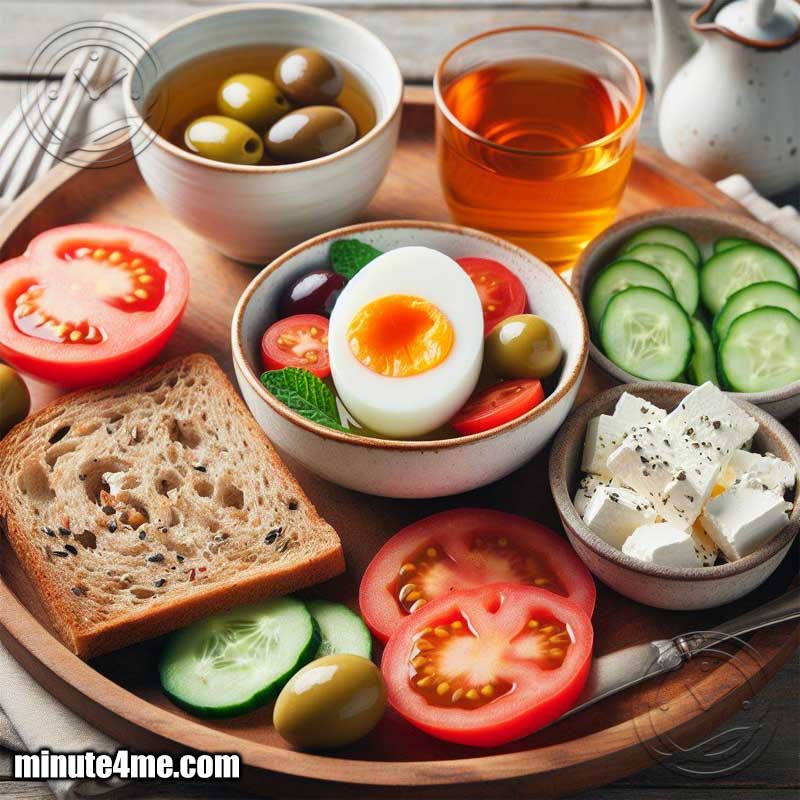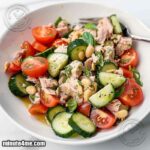Introduction
The cornerstone of the Mediterranean diet is its focus on fresh ingredients and heart-healthy fats, with a priority on enjoying meals in the company of family and friends.
Breakfast, the most important meal of the day, is no exception.
A Mediterranean diet breakfast leverages the power of fruits, vegetables, whole grains, and healthy fats like olive oil to kickstart the day on a nourishing note.
The Foundation of Mediterranean Breakfasts
The Mediterranean diet is renowned for its emphasis on whole, minimally processed foods, which forms the bedrock of its breakfast tradition.
Central to this dietary pattern are a few key components that make up the foundation of Mediterranean breakfasts.
Understanding these elements can help you create a variety of healthful and delicious meals to start your day.
- Fruits and Vegetables: Essential for a vibrant start, these offer vitamins, minerals, and fiber. Incorporating a colorful array of fruits and vegetables into your morning can boost nutrient intake and ensure a burst of natural energy. For example, tomatoes in shakshuka or spinach in an omelet enrich your meal with flavor and nutrients.
- Whole Grains: A source of complex carbohydrates, whole grains like oats, whole-wheat bread, and barley provide the body with sustained energy. They are also rich in fiber, which supports digestive health and keeps you feeling full longer.
- Healthy Fats: The Mediterranean diet highlights the importance of fats for heart health, particularly those from olive oil, nuts, seeds, and avocados. These fats are not only nutritious but also enhance the absorption of fat-soluble vitamins from your meals.
- Protein: Quality protein sources, such as eggs, Greek yogurt, cheese, and legumes, are staples in the Mediterranean breakfast, offering both satiety and muscle support.
By combining these elements, you can create endless breakfast combinations that are both nutritious and satisfying.
Can You Eat Bananas on Mediterranean Diet?
Yes, bananas can be included in the Mediterranean diet. The Mediterranean diet emphasizes whole and unprocessed foods like fruits, vegetables, legumes,…
Quick and Nutritious Mediterranean Breakfasts Recipes
Crafting a Mediterranean-inspired breakfast doesn’t have to be time-consuming.
Here are a few quick and nutritious recipes that embody the Mediterranean diet‘s principles:
Greek Yogurt with Honey and Nuts
- Ingredients: 1 cup Greek yogurt, 1 tablespoon honey, ¼ cup mixed nuts (almonds, walnuts), a handful of berries.
- Preparation: Combine the Greek yogurt with honey, top with nuts and fresh berries.
- Benefits: This breakfast is rich in protein, calcium, and healthy fats, making it an ideal start to your day.
Mediterranean Diet with Sweet Potatoes
Dive into the vibrant world of the Mediterranean diet with a twist – sweet potatoes! Unlocking a treasure trove of…
Avocado on Whole-Wheat Toast
- Ingredients: 1 ripe avocado, 2 slices of whole-wheat bread, pinch of salt, optional toppings: sliced tomatoes, radishes.
- Preparation: Mash the avocado and spread it on toasted whole-wheat bread, season with salt and add toppings as desired.
- Nutritional Highlight: Avocado provides monounsaturated fats and fiber, while the whole-wheat toast offers complex carbohydrates and additional fiber.
Energizing Mediterranean Breakfast Ideas
For those mornings when you need an extra energy boost, consider these Mediterranean breakfast ideas:
Mediterranean Diet Frozen Dinners
Mediterranean diet frozen dinners – a life raft in the sea of your bustling day. This approach combines the time-saving…
Oatmeal with Fruit and Nuts
- Ingredients: ½ cup rolled oats, 1 cup milk (or a dairy-free alternative), 1 tablespoon honey, ½ cup mixed berries, ¼ cup chopped nuts.
- Preparation: Cook the oats in milk according to package instructions, then sweeten with honey. Top with berries and nuts before serving.
- Benefits: Offers a good balance of fiber, protein, and healthy fats. Oats are also a great source of beta-glucan, a type of soluble fiber that helps in managing cholesterol levels.
Frittata with Vegetables and Feta
- Ingredients: 4 eggs, ½ cup diced vegetables (spinach, bell peppers, tomatoes), ¼ cup crumbled feta cheese, 1 tablespoon olive oil, herbs (basil, oregano), salt, and pepper to taste.
- Preparation: Sauté the vegetables in olive oil, whisk the eggs and pour over the vegetables, sprinkle with feta and herbs, and cook until set.
- Highlights: This dish is protein-rich and vegetable-packed, providing a wide array of nutrients along with healthy fats from olive oil and feta.
Mediterranean Breakfasts for the Whole Family
Creating Mediterranean breakfasts that cater to the tastes of both adults and children ensures that the whole family can enjoy a nutritious start to the day together.
The key is focusing on versatile recipes that can be easily adapted to individual preferences while packing in nutrients important for all ages.
Whole-Grain Pancakes with Fruit Toppings:
- Ingredients: Whole-grain pancake mix, water or milk, fresh fruits (berries, sliced bananas), a dollop of Greek yogurt, and a drizzle of honey.
- Family-Friendly Twist: Allow family members to customize their pancakes with their choice of fruits and toppings. It’s a fun way to encourage kids to eat more fruits.
- Benefits: Whole grains for fiber, Greek yogurt for protein, and fruits for essential vitamins and antioxidants.
Mediterranean Muffin Tin Eggs:
- Ingredients: Eggs, diced vegetables (spinach, tomatoes, bell peppers), crumbled feta cheese, olive oil for greasing.
- Preparation: Whisk eggs with a pinch of salt and pepper, stir in vegetables and feta, then pour into greased muffin tins and bake until set.
- Nutritional Highlight: Offers a convenient, protein-rich option with the added benefits of vegetables. These can be made in advance, perfect for quick weekday breakfasts.
Adapting Traditional Breakfasts to Fit the Mediterranean Diet
Transforming traditional breakfast favorites to fit within the Mediterranean diet framework is simpler than one might think.
By substituting certain ingredients and focusing on the inclusion of fruits, vegetables, whole grains, and healthy fats, these adaptations can enrich your breakfast table with nutrient-dense options.

Mediterranean-Style Omelets:
- Swap out heavy creams and meats with olive oil, spinach, tomatoes, and feta or ricotta cheese. This not only reduces saturated fat intake but also increases the intake of vitamins and minerals.
- Key Ingredients: Eggs, olive oil, spinach, cherry tomatoes, feta cheese, herbs.
- Preparation Tip: Use a non-stick pan to minimize the amount of oil needed for cooking.
Quinoa Breakfast Bowls:
- Replace traditional breakfast cereals with quinoa, a complete protein grain, mixed with nuts, seeds, and fresh fruit for a filling breakfast bowl.
- Ingredients: Cooked quinoa, sliced almonds, chia seeds, fresh berries, milk or a dairy-free alternative.
- Health Benefits: Quinoa provides a high-protein, high-fiber alternative to processed cereals, with almonds and chia seeds adding omega-3 fatty acids and additional protein.
The Role of Protein
Protein is a crucial macronutrient in any diet, playing a vital role in building and repairing tissues, making enzymes and hormones, and supporting overall health.
Mediterranean breakfasts, with their emphasis on plant-based foods, also incorporate high-quality protein sources to ensure a balanced diet.
- Eggs: A versatile and high-quality protein source that can be prepared in various ways to suit any breakfast dish.
- Greek Yogurt: Rich in protein and probiotics, it’s an excellent addition to breakfast, either on its own or as a topping for whole-grain cereals and fruits.
- Legumes: Including chickpeas in breakfast dishes like hummus or lentils in savory breakfast salads introduces plant-based proteins and fiber.
- Nuts and Seeds: Almonds, walnuts, and chia seeds are not only good protein sources but also provide healthy fats and fiber.
Conclusion
Adopting a Mediterranean diet breakfast lifestyle is about more than just the foods you eat; it’s about embracing a healthy lifestyle that includes physical activity and enjoying meals with loved ones.
By incorporating the ideas and recipes mentioned here, you can enjoy a variety of flavorful, nutritious breakfasts that not only delight the palate but also support overall health.
Let creativity lead the way as you explore the vast array of foods and flavors within the Mediterranean diet’s guidelines.







